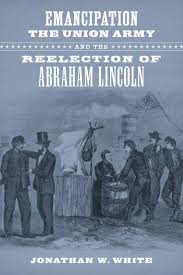Jonathan W. White
2014, 275 pp., Louisiana State University Press, $39.95
ISBN: 978-0-8071-5457-1
Image courtesy of lsupress.org
In the Union army, there seemed to be a peaceful realm of political opinions. At least, that is what history has made us feel sometimes when it came to the Election of 1864. In this book Emancipation, The Union Army and the Reelection of Abraham Lincoln, there is a showcase to the problems which the Union army faced during the time of the election in the wake of the Emancipation Proclamation. The problems created by giving soldiers the vote, the political issues throughout the army once the Proclamation was issued and the differences between the Republicans or Democrats, the army had its share of problems as 1864 reared its head during the time of the election.
Jonathan W. White is an assistant professor of American Studies at Christopher Newport University and has been enthralled with the political spectrum of the American Civil War. His other work is called Abraham Lincoln and Treason in the Civil War: The Trials of John Merryman.
This work is something quite different than the usual study of politics in the American Civil War. There have been many books on the politics throughout the country during the time of the war, but never before has a book presented the politics of the army during. The surprising part of the subject, which White presents with excellence, is the issues which they face. He separates the subjects in an easy to follow fashion starting with the issues of giving the soldiers the vote and the many arguments stemmed in state legislature and national legislature before they were given the vote. Some of them were sent back home to vote while others had to remain in camp to vote with specific colored paper to show the party they would vote for. The problem which occurred with that was the knowledge everyone else had on the person you voted for. Whether your commander was Republican or Democrat could be a problem and many Republican commanders made their Democratic soldiers feel treasonous for even voting for George McClellan. One of the major issues which White talks about is the effect the Emancipation Proclamation had on the army. The idea that the army was formed to preserve the Union was the real reason many of the soldiers had signed up in the army, but now with the emancipation the efforts of the war had shifted. White uses many primary sources through commanders and soldiers to show the hatred some of them had toward Lincoln when the Proclamation was issued. Some of them went even as far to abandon their lines and go over to the Confederate camps, to which they were welcomed. When commanders resigned because of the Proclamation, there was little which showed easement for them after the event. Many of the men who attempted to resign was then dishonorably discharged or brought before a military tribunal. Throughout the book, the atrocities the administration placed on the soldiers and commanders in the army just because they stood for a different political party than that of the president gives the reader a different look at Abraham Lincoln and his cabinet members. Some soldiers who were Democrat but still wanted to fight for the Union became disenfranchised just because of their political stance in the country. Whether or not these actions were shameful are up to the reader because White makes compelling arguments for both sides. This well rounded work shows that scholarship is present in this work beyond some other works in the political realm when dealing with the American Civil War.
I highly recommend this work to anyone interested in the American Civil War. There are so many books which get us caught up in the realm of the battlefield, the political field gets lost. Now, the army is thrown into the political field with such grace and flowing narrative that it is hard to put the book down. Jonathan W. White has done an excellent job showing us the troubles the soldiers had just to garner the vote and then just to vote if they were Democrat. He also places the question of the percentage of the soldier vote which Lincoln obtained in the election. This is an excellent work and I look forward to what White can give us next.

 RSS Feed
RSS Feed
